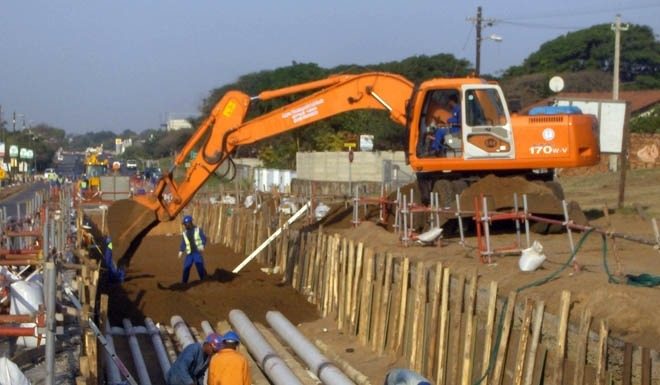There is too much transformation window dressing in Africa’s construction sector and too many entities come up with solutions that satisfy scrutiny, but do not offer real change, according to Frans Pienaar, chair of Inyatsi Construction.
“Very few companies are really serious about transformation and often approach it in the wrong way,” he said in an overview of the sector for 2016.
In Pienaar’s view, society is more than ever tired of money being misspent.
“In 2016 society and the authorities will emphasise quality and delivery as a priority. Transparency will increase and it will become increasingly difficult to hide poor service delivery,” he said.
“Social media have opened a whole new platform and information can go viral in seconds. The challenge remains to improve business efficiencies to survive in the competitiveness of the business environment. The important issue in construction for 2016 is to build sound structures and not just structures.”
He does expect a re-balancing in the construction sector in 2016, due to construction activity “fading” in the mining sector, but picking up in home building.
Yet, he pointed out that studies show while it will have an influence on the construction industry, it will probably not be enough.
“If client bodies were really serious about transformation, they would engage businesses that are prepared to make radical changes to make transformation profitable,” said Pienaar.
“The major players in the industry are still beyond bringing real change. As long as they have a stranglehold on the industry, there will be no change.”
In his view the small and growing contractors are “strangled by a history and systems that benefit the more established companies” and he said studies show the general legislative framework benefits the larger and more established companies and excludes new entrants.
“In addition, it reduces the profitability of smaller entities, as financial services are more expensive for smaller entities and sometimes these mechanisms are not even available to them,” said Pienaar.
This remains an area on which we must focus to help new entrants to the industry. It is not easy and remains a challenge. Studies show infrastructure fulfils a key role in economic growth and reducing poverty, having a 5% to 25% per annum return on investment as an economic multiplier.”
Even though construction in the transport, energy and power sectors is of critical importance for long-term economic growth, Pienaar foresees that these sectors will remain under pressure as other infrastructure areas will receive higher priority.
“This will happen because it will be more politically advantageous to address low-hanging fruit to gain political support, while rather postponing investment in the transport sector,” he said.
In his view energy will remain a strong growth area offering opportunities. These opportunities will be slow, though, because the lead times on these kinds of projects are very long.
“Associated industries will benefit more than the construction industry, as the biggest chunk of investment in the energy and power sectors will be in manufacturing and mechanical and electrical supply investment, rather than in construction itself,” said Pienaar.
An example would be the civil engineering construction portion of a power station, which is a small fraction of the mechanical and electrical manufacturing components.
He foresees that the mining sector will probably also remain constrained in 2016, because the commodities prices will remain under pressure. A stronger dollar could counteract this.
“We already see significant investments from mining houses in preparation for the next up-cycle in resources. The visionary organisations will use this time to prepare for the upswing to be able to fully unlock opportunity when it comes,” said Pienaar.
However, he cautioned that some rationalisation is expected in the South African mining sector.
According to Pienaar studies show urbanisation will drive a large portion of construction growth in the next decade and the market for housing projects is expected to grow in 2016.
“This will ensure a huge demand for housing, which will put infrastructure under pressure. The housing shortfall across Africa is increasing and this trend will continue for some time. Innovation in this area can be a major growth factor in the industry,” said Pienaar.
“With infrastructure under significant pressure, many of Africa’s cities cannot maintain their current levels of population and economic growth without enhancing their infrastructure. The demands for infrastructure vary from city to city based on stage of development, priorities and affordability. The basic needs for power, water and sanitation, transport and logistics, housing and ICT top the list for most.”
In its latest business confidence index, released on Thursday, the SA Chamber of Commerce and Industry (Sacci) said there is a dire need of affirmative economic policy action. Sacci is also concerned about the slowdown in building plans passed.



